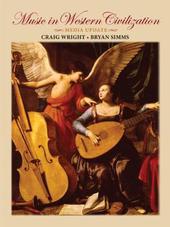
|
Music in Western Civilization, Media Update (with Resource Center Printed Access Card)
Mixed media product
Main Details
| Title |
Music in Western Civilization, Media Update (with Resource Center Printed Access Card)
|
| Authors and Contributors |
By (author) Bryan Simms
|
|
By (author) Craig Wright
|
| Physical Properties |
| Format:Mixed media product | | Pages:912 | | Dimensions(mm): Height 284,Width 222 |
|
| Category/Genre | Music |
|---|
| ISBN/Barcode |
9780495572732
|
| Classifications | Dewey:780.9 |
|---|
| Audience | | Tertiary Education (US: College) | |
|---|
| Edition |
New edition
|
|
Publishing Details |
| Publisher |
Cengage Learning, Inc
|
| Imprint |
Schirmer Books,U.S.
|
| Publication Date |
27 February 2009 |
| Publication Country |
United States
|
Description
Presenting music in its cultural context in a way that is clear and easy to understand, MUSIC IN WESTERN CIVILIZATION, MEDIA UPDATE offers detailed discussions of 224 works of music, covering all the major musical styles, genres, and composers in 83 brief yet intriguing chapters. The book places music in the context of the politics, personalities, arts, and humanities of each period of Western history. The importance of the cultural setting of many composers and genres is evidenced by such chapters as 'Richard Strauss in Berlin,' 'Johann Sebastian Bach: Vocal Music in Leipzig,' and 'Music in Medieval Paris: Polyphony at Notre Dame.'
Author Biography
Bryan R. Simms (Bachelor of Arts, Yale University, 1966; Ph.D., Yale University, 1971) has taught since 1976 at the University of Southern California, where he has been director of graduate studies and is currently chair of the department of musicology. He is the recipient of fellowships from the National Endowment for the Humanities and the Fulbright Foundation. He is the author of books and articles on topics in twentieth-century music and music theory, including MUSIC OF THE TWENTIETH CENTURY (Schirmer 1996) and, most recently, THE ATONAL MUSIC OF ARNOLD SCHOENBERG, 1908-1923 (Oxford University Press). Craig M. Wright received his Bachelor of Music degree at the Eastman School of Music in 1966 and his Ph.D. in musicology from Harvard University in 1972. He began his teaching career at the University of Kentucky and for the past 40 years has been teaching at Yale University, where he is the Henry L. and Lucy G. Moses Professor of Music as well as Director of Online Education. He teaches his perennially popular introductory course "Listening to Music", also part of the offerings of Open Yale Courses, and his selective seminar "Exploring the Nature of Genius". The author of numerous scholarly books and articles on composers ranging from Leoninus to Bach, Dr. Wright has also received many awards, including a Guggenheim Fellowship, the Einstein and Kinkeldey Awards of the American Musicological Society, and the Dent Medal of the International Musicological Society. In 2004 he was awarded the honorary degree Doctor of Humane Letters from the University of Chicago, and in 2010 he was elected as a member of the American Academy of Arts and Sciences, joining fellow inductee banjo player Steve Martin. Dr. Wright has also published LISTENING TO MUSIC, CHINESE EDITION (Cengage Learning/Three Union Press, 2012), translated and simplified by Profs. Li Xiujung (China Conservatory, Beijing) and Yu Zhigang (Central Conservatory, Beijing), both of whom worked with Wright at Yale; LISTENING TO MUSIC and LISTENING TO WESTERN MUSIC, Seventh Editions (Cengage Learning, 2015); and MUSIC IN WESTERN CIVILIZATION, MEDIA UPDATE (Cengage Learning, 2010) with coauthor Bryan Simms. He is presently at work on a volume titled MOZART'S BRAIN: EXPLORING THE NATURE OF GENIUS.
Reviews"[The writing] was the book's principle strength. It is a truly accessible book. . . . Students might even become better writers by reading this textbook! . . . It's probably alone in its field in this respect, and I can't praise it enough. . . . Students can learn with this book, and I don't say that about many textbooks." "Finally a textbook that examines the history if music in the wider context of Western civilization. The reader gets a clear sense of how music functioned in society."
|